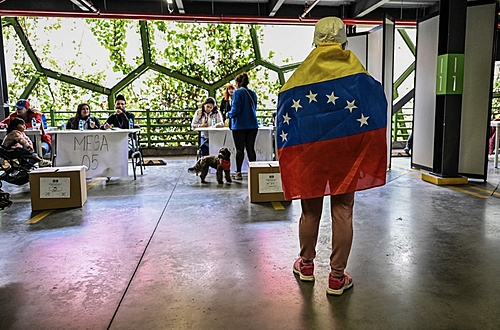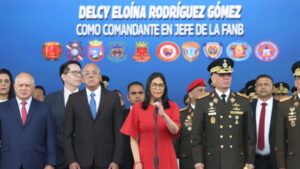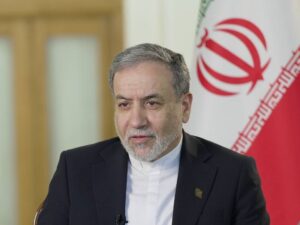
Venezuela is experiencing days of heightened political tensions and not even the electoral agreement signed in Barbados has managed to establish a period of harmony between the government and the extremist sector of the right-wing opposition united in the Democratic Unitary Platform (PUD) coalition.
This is because the holding of primary elections by opponents and the victory of ultra-liberal Maria Corina Machado triggered a series of provocations and exchanges of accusations that even involved a threat from the US to withdraw the latest relief from sanctions against the country’s oil industry.
On the one hand, the government of President Nicolás Maduro and other sectors of the opposition accuse the PUD of rigging the consultation held on October 22nd. Furthermore, according to the Chavista delegation that participated in the dialogues in Barbados, the primaries would be violating the signed agreements because they did not respect the criteria established by the document, as the opposition refused technical support and auditing from the National Electoral Council (CNE).
The vote, carried out completely manually and with the absence of adequate structures denounced even by organizers, became a judicial issue when the Venezuelan Supreme Court ordered this Monday (30) that opponents hand over all voting minutes to the Court. On the same day, the president and vice-president of the so-called “National Primary Commission”, the group responsible for organizing the vote, were summoned to testify at the Public Prosecutor’s Office after being accused of “usurpation of electoral functions, identities, money laundering and gang formation”.
The PUD and the winning candidate in the primaries are trying to instrumentalize the vote to attract more support from the USA and claim a certain popular legitimacy, since the last national election in which Maria Corina Machado participated was in 2010, when she was elected deputy to the National Assembly of the country. The objective of the consultation was to define a unified opposition presidential candidacy for the Venezuelan presidential election that should take place in the second half of 2024.
:: What’s happening in Venezuela ::
In his first speech after the results, Machado focused his speech on “convincing the international community” of the importance of fighting against Maduro and mentioned few proposals or even campaign strategies, since a disqualification issued by the Comptroller General of the Republic in 2015 would prevent her from running for President in 2024.
Furthermore, the opponent’s stance remains confrontational against Chavismo and in a press conference she even said that President Nicolás Maduro “would not dare” to participate in a debate with her. A historical figure of the most reactionary sectors of the Venezuelan opposition, Machado is betting on a massive privatization program to rival the government in a possible electoral campaign and constantly talks about “wiping out socialism” from Venezuela.
“What is certain is that, with the primaries, she positions herself as the sole representative of the opposition, as a kind of second Juan Guaidó”, says Carlos Dürich. In an interview with Brazil in factthe political analyst and member of the Venezuelan communication collective Tatuy TV states that the opponent is already behaving like a presidential candidate, but must face problems because the process that chose her “was full of irregularities from beginning to end.”
:: Venezuelan right-wing elects ultra-liberal candidate to run in the 2024 presidential election ::
“This self-proclamation does not have much force because there is no way to audit the primary process, as it did not have observers or support from the CNE”, he explains.
Dispute over numbers goes to court
The lack of transparency cited by Dürich is one of the main arguments used by the government and other sectors of the opposition to accuse the PUD of rigging the primaries. According to the election organizing committee, more than 2.5 million people participated in the election and Machado would have been elected with more than 92% of the votes.
The data was contested by the president of the Legislature, Chavista deputy Jorge Rodríguez, who cited a “own count” carried out by the government and claimed that participation would have been 598,350 voters. According to CNE data, around 21 million Venezuelans were eligible to vote in the primaries.
“What happened on Sunday was not an election, it was a farce. An election has elements that must be respected so that the vote can be auditable, fair and free. What happened on Sunday cannot be audited,” said the deputy.
::Venezuela: opposition bloc in Parliament denounces ‘vices and irregularities’ in the primaries::
The government’s accusations reached the Public Prosecutor’s Office days later and were converted into formal subpoenas this Monday, when the president of the “National Primary Commission”, Jesús Maria Casal, and the vice-president, Mildred Camero, appeared at the MP’s headquarters in Caracas to give testimony.
Furthermore, upon an appeal filed by opposition deputy José Brito, who is part of the Democratic Alliance coalition that rivals the PUD, the Supreme Court of Justice annulled the results of the primaries and demanded that the organizers present all the materials that were used to determine the results.
Maria Corina, in turn, continues to classify herself as “politically persecuted” and describing the government as “an authoritarian regime”. According to analysts, Machado’s victory in the primaries ended up threatening the stability of the agreements signed in Barbados, as it is not clear whether the opponent will support the document or use force to reverse its disqualification.
:: Maria Corina Machado: Who is the Venezuelan opposition ::
“Maria Corina’s political bloc has always been associated with extremism that relied on insurrections, such as the coup against former president Hugo Chávez in 2002 and the guarimbas of 2014 and 2017. Therefore, what appears to be happening if her disqualification is not reversed is a scenario of tension and possibly insurrection”, says Dürich.
US threatens Venezuela
The scenario became even more complex after the US threatened not to renew relief in the blockade against Venezuelan oil if Maria Corina remained prevented from running for President. Following the agreement signed in Barbados, Washington issued general licenses that, in practice, temporarily suspended some sanctions against Venezuela’s energy sector and will allow the country to return to the international market.
However, US Secretary of State Antony Blinken said shortly after the primaries that if Machado’s disqualification was not canceled, the licenses would not be renewed within the six-month period set by the Treasury Department as a limit.
The threats were poorly received by Caracas, which called for respect for national laws and agreements signed with the opposition. “When they said what they said, they expressed immense ignorance about how the legal system and the Constitution of Venezuela work. They should already know that Venezuela does not accept pressure, nor blackmail, nor bribes, nor interference by power or any country”, replied Jorge Rodríguez.
:: US announces temporary suspension of sanctions against Venezuelan oil and gas ::
“Blinken’s statements show that there is no homogeneous position in the White House regarding what to do with the Venezuelan issue”, says Sergio Rodríguez Gelfenstein. Former Venezuelan diplomat and doctor in Political Studies, he raised Brazil in fact the hypothesis that, while publicly defending a narrative in support of Machado, the US is more interested in preserving its own interests.
“There is a point that they now call the ‘red line’, which was the issue of disqualifications, but the disqualifications are not in the Barbados Agreements, they were left out, which clearly shows that the US is working in accordance with its interests and not due to the interests of the Venezuelan opposition, they have already used them and now they discard them, as they always do”, he states.
Gelfenstein also explains that the war in Ukraine accelerated the need for Washington to look for new sources of fuel, as the import of Russian goods was interrupted. Until September, before the suspension of sanctions, Venezuela produced between 700 and 800 thousand barrels of oil per day, according to OPEC data.
“It’s not that overnight President Joe Biden discovered that Venezuela can be a friendly country, or that he believes that President Maduro is managing well and that the two countries, despite their differences, can have good relations. No, it’s nothing like that. This situation responds to the serious problem that Washington has in terms of oil and the internal political situation, as there are presidential elections in the USA next year”, he says.
Editing: Leandro Melito

Source: www.brasildefato.com.br

